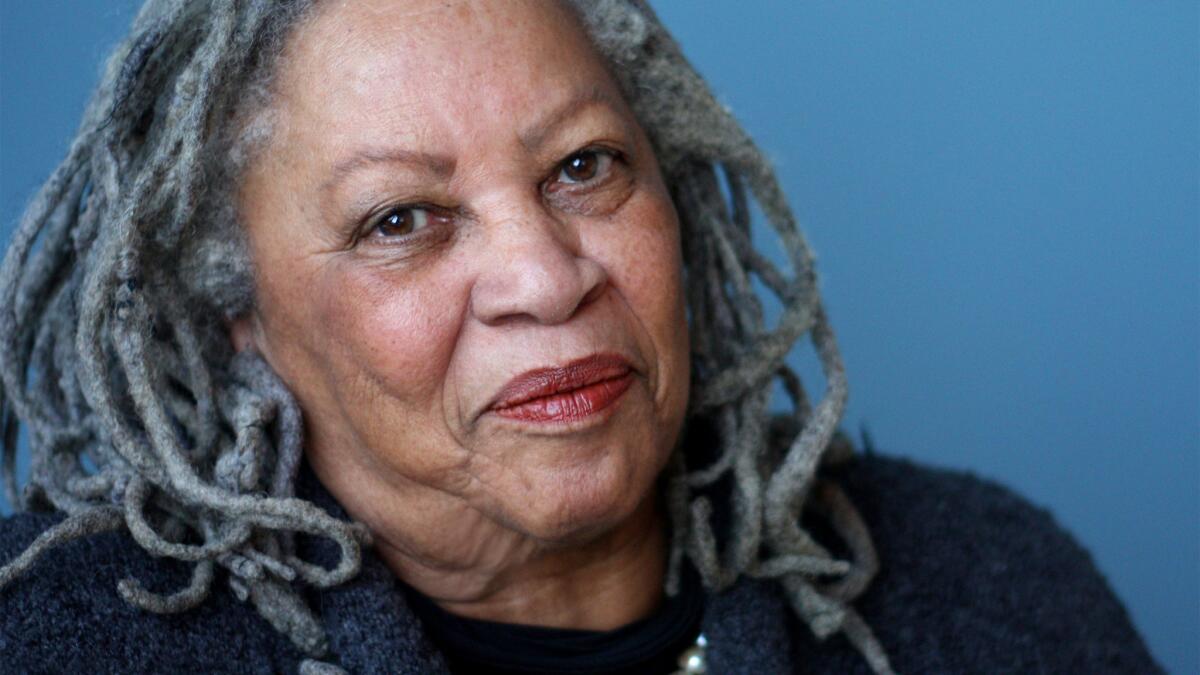Happy birthday, Toni Morrison!

- Share via
Today is Toni Morrison’s 84th birthday. The Nobel laureate is the author of the novels “Beloved,” “Song of Solomon,” “Sula” and more than a dozen others.
Morrison is a literary and cultural force. When other writers are slowing down, Morrison continues to write. She’s publishing a new novel, “God Help the Child,” in April.
She was born Chloe Wofford in Lorain, Ohio, in 1931. She sometimes wrestles with Toni, a nickname since high school, and Morrison, her ex-husband’s name. Chloe she likes. “That’s a Greek name. People who call me Chloe are the people who know me best,” she told Boris Kachka of NY Magazine in 2012. “Chloe writes the books.”
Morrison was the second oldest of four children, the daughter of a welder and domestic worker. She excelled at school, studied English at Howard University and did her graduate studies at Cornell -- all before the civil rights movement. In the early 1960s, while teaching college English, she began to write.
“I didn’t want to be a writer as a young person,” she said in 1998. “I was quite happy to be a reader. And I do not remember my life, literally, before I could read. I didn’t come to life as a writer until I was in my 30s.”
She made her way to New York and to a job as an editor. Divorced and with two young sons, Morrison was working full time when she published her first book, the 1970 novel “The Bluest Eye.”
She followed it with “Sula” (1973), “Song of Solomon” (1977), which won the National Book Critics Circle Award for fiction, and “Tar Baby” (1981). Each book brought her a greater level of readership and acclaim.
In 1981, as a member of the National Urban Coalition, she spoke before the conservative-leaning Presidential Task Force on the Arts and Humanities, appointed by President Reagan. During her testimony at a public meeting at the L.A. Times, Morrison said, “Merely to think about the arts is sometimes incendiary. To touch art, to brush up against it is like touching a live wire. It shocks. Art always shocks.”
Six years later, she published “Beloved,” considered by some to be her greatest work. Reviewing the book in the L.A. Times, critic John Leonard wrote, “‘Beloved’ belongs on the highest shelf of American literature, even if half a dozen canonized white boys have to be elbowed off. The thing is, now I can’t imagine American literature without it.” The novel won the Pulitzer Prize; when it failed to take the National Book Award, dozens of African American authors launched a major public protest.
Morrison, of course, survived. She became a professor at Princeton in 1989. in 1992, her novel “Jazz” was published. In 1993, she was named the recipient of the Nobel Prize in Literature, cited as “a literary artist of the first rank” who “delves into the language itself, a language she wants to liberate from the fetters of race.”
The first black woman to be accorded the honor, and she was only the second American woman to have been awarded the prize, 65 years after it had gone to Pearl S. Buck.
“I am outrageously happy,” she said in a statement before teaching her afternoon class at Princeton. “I am, of course, profoundly honored. But what is most wonderful for me, personally, is to know that the prize at last has been awarded to an African American.”
“Winning as an American is very special, but winning as a black American is a knockout,” she continued. “Most important, my mother is alive to share this delight with me.”
When her novel “Paradise” was published in 1998, Morrison told the L.A. Times, “I am always trying to say what it is, what the truth really is. I never avoid the risk.”
A film version of “Beloved” was released in 1998. Special attention from Oprah, who produced and starred in the film, helped Morrison’s work reach an even broader audience.
Her novels are frequently found on class syllabi. Their frank treatment of race, violence and sexuality have often made them targets of censors: “Beloved” and “The Bluest Eye” remain among the most banned and challenged books in America.
Morrison retired from Princeton in 2006, but she continues to write. her upcoming book, “God Save the Child,” is about a dark-skinned African American woman who calls herself Bride.
The New Yorker excerpted the novel in its Feb. 9 issue. “It’s not my fault. So you can’t blame me,” Bride’s mother says. “I didn’t do it and have no idea how it happened. It didn’t take more than an hour after they pulled her out from between my legs for me to realize something was wrong. Really wrong. She was so black she scared me. Midnight black, Sudanese black. I’m light-skinned, with good hair, what we call high yellow, and so is Lula Ann’s father. Ain’t nobody in my family anywhere near that color.”
In 1993, Morrison talked to the Paris Review about writing. “[W]hat makes me feel as though I belong here out in this world is not [being] the teacher, not the mother, not the lover, but what goes on in my mind when I am writing. Then I belong here and then all of the things that are disparate and irreconcilable can be useful. I can do the traditional things that writers always say they do, which is to make order out of chaos.”
Happy birthday, Toni Morrison!
Book news and more; I’m @paperhaus on Twitter
More to Read
Sign up for our Book Club newsletter
Get the latest news, events and more from the Los Angeles Times Book Club, and help us get L.A. reading and talking.
You may occasionally receive promotional content from the Los Angeles Times.








